
About Andrew Cusack
 Writer, web designer, etc.; born in New York; educated in Argentina, Scotland, and South Africa; now based in London.
Writer, web designer, etc.; born in New York; educated in Argentina, Scotland, and South Africa; now based in London. read more
News
Blogs
Reviews & Periodicals
Arts & Design
World
France
Mitteleuropa
Knickerbockers
Argentina
The Levant
Africa
Cape of Good Hope
Netherlands
Scandinavia
Québec
India
Muscovy
Germany
Academica
“Der Rote Baron”
Foreign Film Fictively Frames Favorite Fabled Freiherr
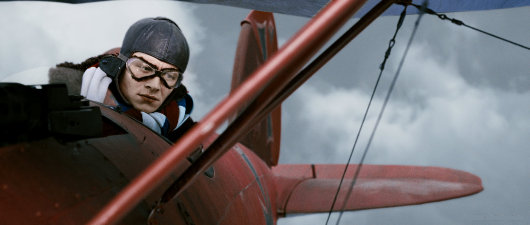
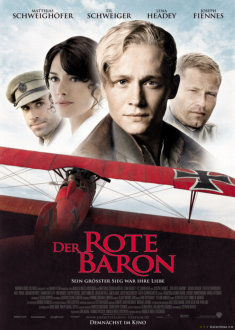 Our cunning cousin, the Hun, has cleverly concealed a card up his hunting-jacket sleeve. Just when you thought the continual winging by hand-wringing Germans about their militarist past (or at least the thoroughly shameful parts thereof) would never end, a new film depicts the life of the dashing Manfred Albrecht Freiherr von Richthofen: better known to us as The Red Baron.
Our cunning cousin, the Hun, has cleverly concealed a card up his hunting-jacket sleeve. Just when you thought the continual winging by hand-wringing Germans about their militarist past (or at least the thoroughly shameful parts thereof) would never end, a new film depicts the life of the dashing Manfred Albrecht Freiherr von Richthofen: better known to us as The Red Baron.
“Der Rote Baron” is showing in den deutschen Kinopalästen as we speak, but the motion picture was not actually meant for a German audience: this is but part of the clever ruse. The film was actually made in English and then dubbed back into German by the mostly Allemanic cast.
Having convinced us of their peaceful intentions through more than a half-century of “Guys, we really messed up circa 1933-1945”, the obvious intent is to swamp the English-speaking world with a film depicting the charming gentlemen fighters of the first weltkreig in order to disarm us as they prepare for their dastardly plans.
Why, as we speak, Georg Friedrich von Preussen is polishing his pickelhaube and dusting off his feather cap in preparation for this latest Prussian plot for world domination. While the Western world worried itself sick over global Islamism and the Chinese threat, little did we know that a swelling irredentism was brewing deep within the hearts of every Berliner; a tear developing in the eye at the mere mention of Tsingtao; a soul in mourning for the loss of Tanganyika. How naïve we were not to realize that all those bright young Germans spending their gap year teaching smiling Herero natives in Namibia were actually forward units of intelligence-gatherers yearning for the return of Ketmanshoop and Swakopmund to the Germanic fold.
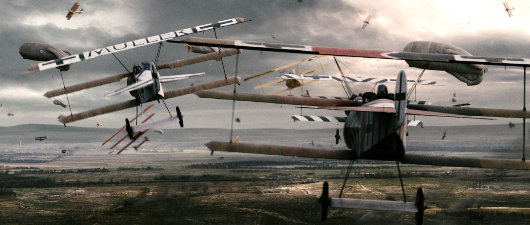
While we don’t actually share the Germanophobia of, say, Chesterton or Churchill, it has to be said there is something a touch distasteful about Prussian militarism. The ideal militarism, we believe, is about 50% Swiss, 40% British, and 10% Austro-Hungarian. Nonetheless, we are forced to admit that before the German grape went distinctly sour ’round 1933 there were a number of rather interesting characters, and Manfred von Richthofen is undeniably among them. (Well, obviously there were some pretty good eggs around after 1933 as well).
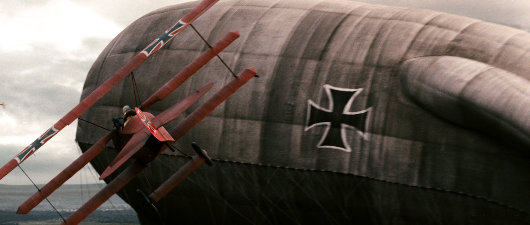
Born in 1892, Freiherr von Richthofen was born into an interesting (though Protestant) family. His uncle, Walter von Richthofen, moved to Denver and started the Chamber of Commerce there. Uncle Walter founded the town of Montclair, Colorado and there built Richthofen Castle, now supposedly haunted (perhaps because the evil commercial spirit has developed suburban homes on the grounds and put the Red Baron Pub in the basement). Another uncle, Ferdinand, was a noted geographer and scientist who has a range of mountains in deepest China named after him.
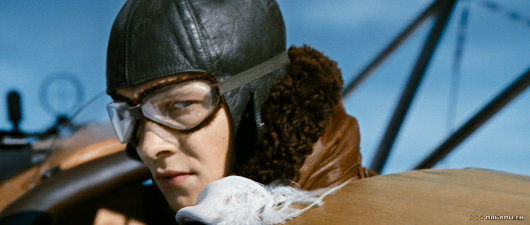
But Manfred is, of course, the most famous of the lot. He developed a keen sharpshooting ability by game-hunting from the age of eleven, and put this skill to great effect as a fighter pilot in the Imperial German Army Air Service, the world’s first air force. With 80 kills, he was the greatest ace of the First World War, beating René Fonck’s 75 and the 73 of Major Mick Mannock (VC DSO & Two Bars MC & Bar).
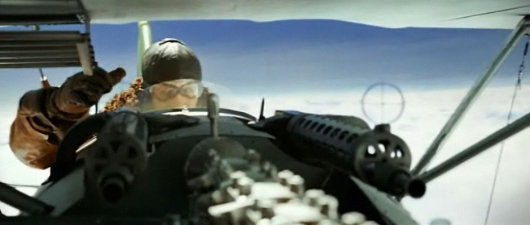
As the Daily Telegraph reports: “Much of von Richthofen’s reputation as a gentleman combatant stems from his famous decision to abandon a dogfight with a British pilot when he saw that his opponent’s gun had jammed.
“Rather than finishing the Briton off, he forced him to land and then disembarked from his own aircraft and shook hands with him.”
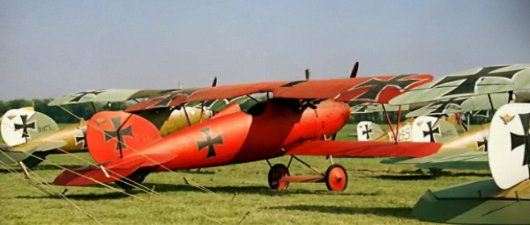
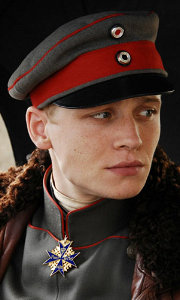 So who’s who in this latest telling of the Richthofen story? The Red Baron himself is played by Matthias Schweighöfer (right), born in 1981 when his native Pomerania was still part of the German Democratic Republic, a.k.a. Communist East Germany. His career has been overwhelmingly German, and so he hasn’t appeared in anything I’ve ever heard of, though he did play Schiller in a 2005 German TV production of the same name, and it is believed he will be in the upcoming “Valkyrie”, alas.
So who’s who in this latest telling of the Richthofen story? The Red Baron himself is played by Matthias Schweighöfer (right), born in 1981 when his native Pomerania was still part of the German Democratic Republic, a.k.a. Communist East Germany. His career has been overwhelmingly German, and so he hasn’t appeared in anything I’ve ever heard of, though he did play Schiller in a 2005 German TV production of the same name, and it is believed he will be in the upcoming “Valkyrie”, alas.
Mr. Schweighöfer has proved a cornerstone of the production, staying faithful to the director Nikolai Müllerschön while funding was found, lost, found, lost again, and finally raised entirely by a private group of individuals. While not terribly aristocratic, he does seem able to convey the casual swagger required by our image of the dashing young von Richthofen. The parts of the trailer where he’s a little weepy seem a bit naff, but such scenes probably shouldn’t be in the movie in the first place. We’ll wait until we see the actual film before convicting.
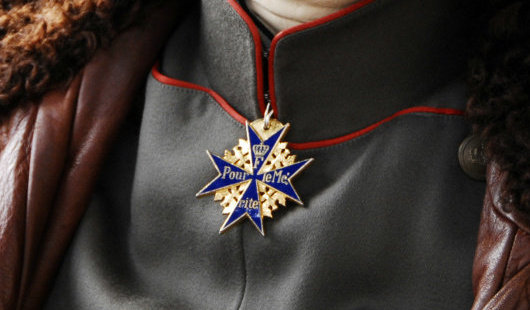
The medal dangling from von Richthofen’s neck is Prussia’s highest honor: the coveted “Pour le Mérite”, nicknamed ‘The Blue Max’.
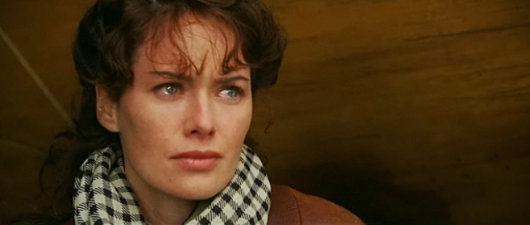
Richthofen’s love interest Käte is played by the Briton Lena Headey. Ms. Headey played Queen Gorgo in the much-ridiculed recent Thermopylae film “300”, and was wife to Dougray Scott in “Ripley’s Game”, a 2002 film which was much better than I expected.
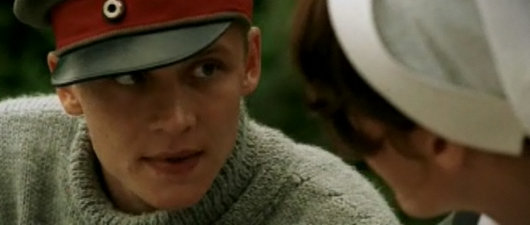
“Don’t worry, Katie my dear. I brought the smelling salts in case you are overwhelmed by the jaunty angle of my cap.
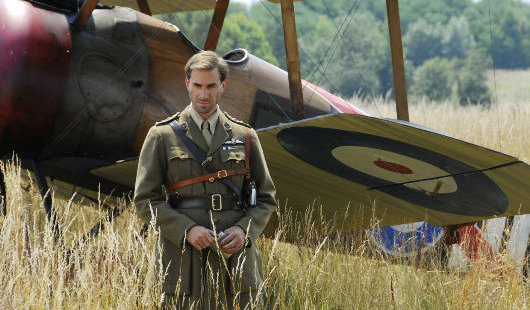
Joseph Fiennes was dragged from a peaceful meadow in which he had been wandering to play the Canadian ace Capt. Roy Brown.
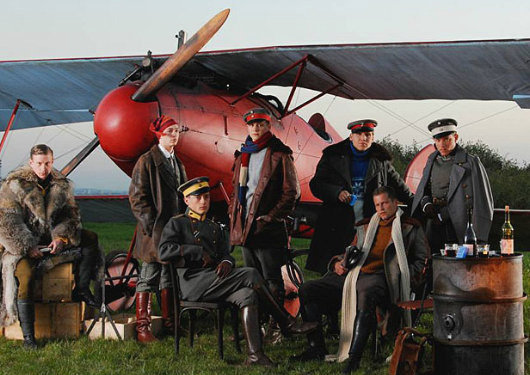
Richthofen’s squadron includes Til Schweiger as the legendary Werner Voss, Volker Bruch as Manfred’s brother Lothar, Maxim Mehmet as the fictional Lt. Sternberg, Steffen Schroeder as Lt. Bodenschatz, Hanno Koffler as Lt. Lehmann, and Tino Mewes as Lt. Wolff. I’ve never seen anything any of these people have been in, and so can offer no opinions. Rather nifty, though, is that Richthofen’s splendidly-named mother Kunigunde is played by Mr. Schweighöfer’s actual mother Gitta.
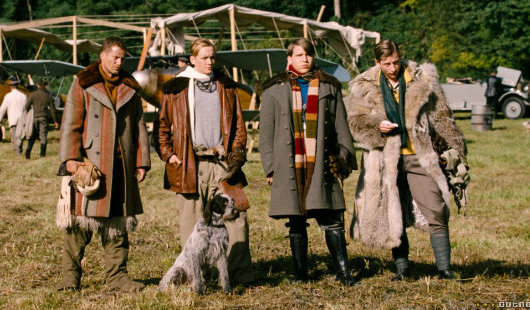
The film also features a dog.
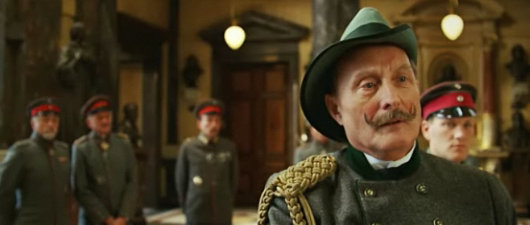
Richthofen does meet Kaiser Wilhelm II, who offers the ace a few congratulatory words.
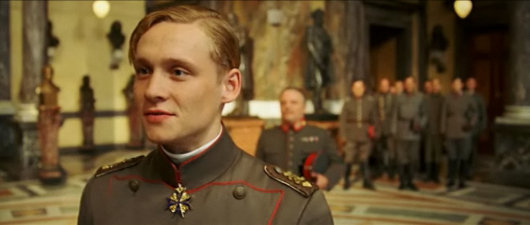
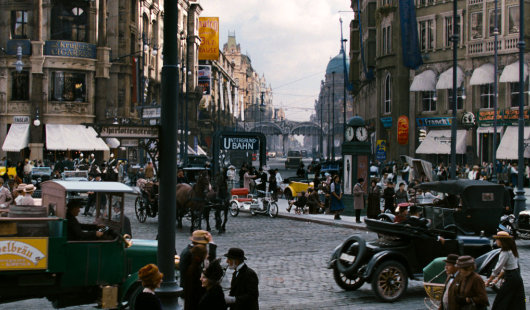
Wilhelmine Berlin is recreated with the help of computers. Seen here, Charlottenstraße.
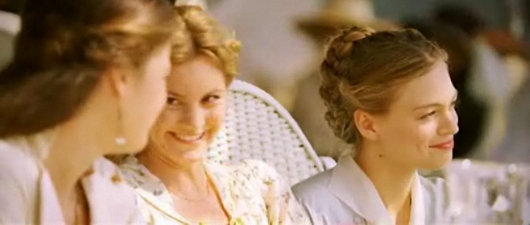
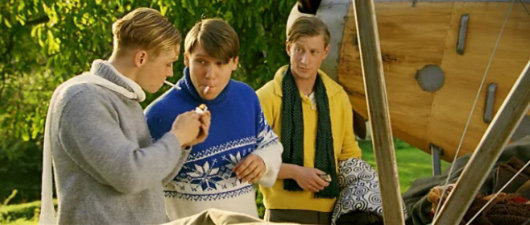
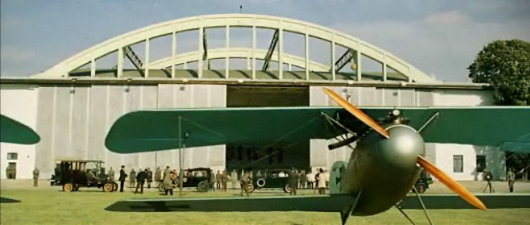
What do the critics actually make of the film? Variety reports that “the production and costume design soar but the drama and characters hardly get one wheel off the ground”.
Budgeted at a reported $15 million, privately raised by Stuttgart-based Niama Film, which is co-owned by helmer Nikolai Muellerschoen, the movie was shot in both German and English-language versions, with German leads speaking their own lines (creditably) in the latter. But pic’s main fault affects both versions: a script that shuttles from one datelined sequence to another, often with no connecting material, and a lack of engaging character drama.
By comparison, even Roger Corman’s iffy 1971 “The Red Baron” (aka “Von Richthofen and Brown”), looks surprisingly good. And in sheer aerial exhilaration and ambition, John Guillerman’s 1966’s “The Blue Max” dramatizes the same period much more cinematically.
Political correctness is rife, with an invented character (Maxim Mehmet) repping various German Jews who flew in WWI, and Kaete popping up at intervals (and in the most unlikely places) to lecture Manfred about the evils of war.

Despite the poor reviews, I’ll still give it a try. That is, providing this latest Prussian plot even reaches theatres on these far shores; there’s a rumor going round that it will avoid a theatrical release and head straight to DVD in the States, which (if true) is rather foolish of the producers. While it can be difficult for an independent production to get a distributor, surely an action-oriented film like this could manage at least a fortnight in New York & L.A.
Previously: The Two Germanies
Movies: “Brideshead” Regurgitated
Search
Instagram: @andcusack
Click here for my Instagram photos.Most Recent Posts
- A Christmas Gift from the Governor December 24, 2024
- Oude Kerk, Amsterdam December 24, 2024
- Gellner’s Prague December 19, 2024
- Monsieur Bayrou December 18, 2024
- Dempsey Heiner, Art Critic December 17, 2024
Most Recent Comments
Book Wishlist
Monthly Archives
Categories



I’ve not seen the film, but shall look forward to doing so. I’ve never met Georg Friedrich, but do look forward to his taking the throne.
The Richtofens are indeed an interesting family. Their name was originally Schmitt (Smith) and they were ennobled as late as 1661. The Red Baron’s line were given a Prussian barony in 1741. They are anything other than Junkers; more a family of Hansa merchants who made it good in the 16th century and then married well, studied hard, and made sure to buy up the estates of the less-intelligent Silesian nobility amongst whom they lived and prospered. A member of another branch was a Field Marshall in World War II, and Manfred was first cousin once-removed to General Alexander von Falkenhausen, Military Governor in Belgium during the same war.
Interestingly again, he was twice descended from German princely houses: Anhalt-Dessau and Brandenburg-Ansbach-Bayreuth, both through morganatic descents. An ancestral grandfather was thus the “Alte Dessauer” one of the great generals of the early 18th century.
Through his commoner grandmother Maria Seip he was also a distant cousin of Johann Wolfgang (von) Goethe. Then too his very distant cousin Frieda v Richtofen was married for a time to D H Lawrence.
So yes, all in all an interesting family.
I have just one question about the film, which looks as though it will be delectable to look at at least: does Hermann Goering merit a mention, he who succeeded the Red Baron as Leader of his justly famous squadron? Or is this historically indubitable fact unpleasing to our masters, and thus banished from our ken?
What, no mention of Billy Bishop, the greatest ace of the British Empire. Mannock actually only had 61 confirmed kills to Bishop’s 72. Bishop also won the Victoria Cross and is one of three Canadians who made up the top ten aces of the Great War. Google “The Aerodrome”.
But don’t forget William “Dozy” Claxton, just because he “only” had 37 kills. In my opinion, the balsiest and perhaps the greatest ace of the Great War. He arrived much later than the others and not until middle of 1918, yet managed to get 37 kills in the space of 79 days, sometimes four or five in a single day! Completely fearless with a reckless regard for his own life. Miraculously came out alive in a dogfight with 40 German fighters on one occasion. Totally Red Baron material.
I am German and I saw the movie. It is not as action-oriented as the title suggests. There are a few nice battle scenes, but a felt 80% of the movie deals with the (invented) love relationship between the Red Baron and a nurse (remember Pearl Harbour).
They left out all important battles (even the Red Baron`s final battle is not shown). The dialogues are crappy.
It was produced for the international market, but I doubt that it will be released anywhere else but in Austria.
A most amusing review. And, yes, the film may be pretty to look at, but the historical inaccuracies and ridiculous made-up romance may well leave sugar-sores in the mouth.
i think they could have chosen someone who looked more like voss…other than that, its great!!!!